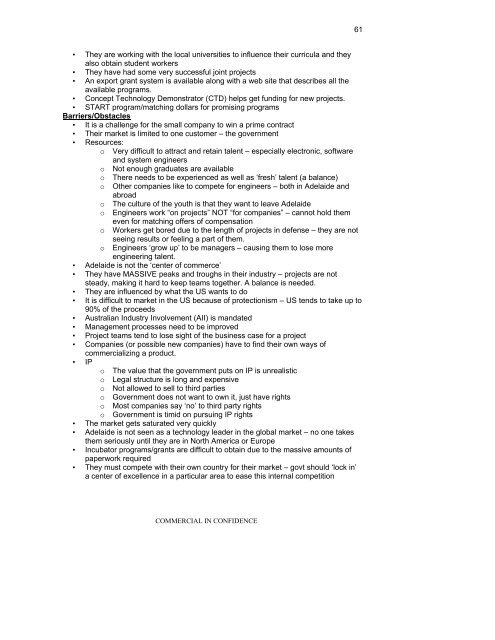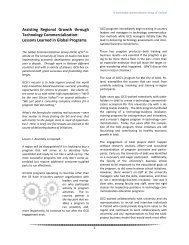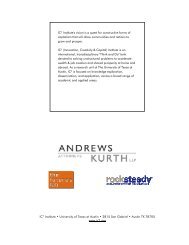“Quicklook” Assessment of Greater Adelaide's Assets & Challenges ...
“Quicklook” Assessment of Greater Adelaide's Assets & Challenges ...
“Quicklook” Assessment of Greater Adelaide's Assets & Challenges ...
Create successful ePaper yourself
Turn your PDF publications into a flip-book with our unique Google optimized e-Paper software.
• They are working with the local universities to influence their curricula and they<br />
also obtain student workers<br />
• They have had some very successful joint projects<br />
• An export grant system is available along with a web site that describes all the<br />
available programs.<br />
• Concept Technology Demonstrator (CTD) helps get funding for new projects.<br />
• START program/matching dollars for promising programs<br />
Barriers/Obstacles<br />
• It is a challenge for the small company to win a prime contract<br />
• Their market is limited to one customer – the government<br />
• Resources:<br />
o Very difficult to attract and retain talent – especially electronic, s<strong>of</strong>tware<br />
and system engineers<br />
o Not enough graduates are available<br />
o There needs to be experienced as well as ‘fresh’ talent (a balance)<br />
o Other companies like to compete for engineers – both in Adelaide and<br />
abroad<br />
o The culture <strong>of</strong> the youth is that they want to leave Adelaide<br />
o Engineers work “on projects” NOT “for companies” – cannot hold them<br />
even for matching <strong>of</strong>fers <strong>of</strong> compensation<br />
o Workers get bored due to the length <strong>of</strong> projects in defense – they are not<br />
seeing results or feeling a part <strong>of</strong> them.<br />
o Engineers ‘grow up’ to be managers – causing them to lose more<br />
engineering talent.<br />
• Adelaide is not the ‘center <strong>of</strong> commerce’<br />
• They have MASSIVE peaks and troughs in their industry – projects are not<br />
steady, making it hard to keep teams together. A balance is needed.<br />
• They are influenced by what the US wants to do<br />
• It is difficult to market in the US because <strong>of</strong> protectionism – US tends to take up to<br />
90% <strong>of</strong> the proceeds<br />
• Australian Industry Involvement (AII) is mandated<br />
• Management processes need to be improved<br />
• Project teams tend to lose sight <strong>of</strong> the business case for a project<br />
• Companies (or possible new companies) have to find their own ways <strong>of</strong><br />
commercializing a product.<br />
• IP<br />
o The value that the government puts on IP is unrealistic<br />
o Legal structure is long and expensive<br />
o Not allowed to sell to third parties<br />
o Government does not want to own it, just have rights<br />
o Most companies say ‘no’ to third party rights<br />
o Government is timid on pursuing IP rights<br />
• The market gets saturated very quickly<br />
• Adelaide is not seen as a technology leader in the global market – no one takes<br />
them seriously until they are in North America or Europe<br />
• Incubator programs/grants are difficult to obtain due to the massive amounts <strong>of</strong><br />
paperwork required<br />
• They must compete with their own country for their market – govt should ‘lock in’<br />
a center <strong>of</strong> excellence in a particular area to ease this internal competition<br />
COMMERCIAL IN CONFIDENCE<br />
61





